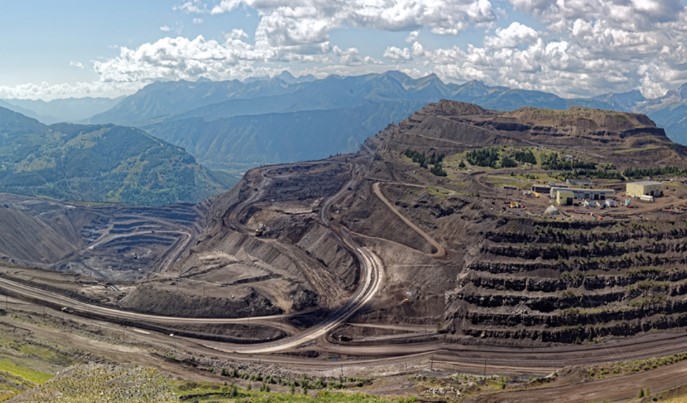
Fording River is one of Teck’s four steelmaking coal operations located in the Elk Valley of British Columbia. (Image courtesy of Teck Resources.)
Teck Resources Ltd. (TSX: TECK.B) is set to become a pure-play metals producer after announcing a deal to sell its steelmaking coal assets to a consortium led by Glencore PLC. Teck without coal could be an investor’s dream.

The Vancouver-based miner’s dramatic repositioning comes at a good time for investors: The United States and China this week declared their support for ramping up renewable energy capacity in a big way, which would drive global demand for the copper that Teck mines in British Columbia, Chile and Peru.
The No. 1 and No. 2 economic powerhouses – antagonists over just about everything but also the world’s largest polluters – made the announcement through a joint statement issued ahead of a meeting this week between U.S. President Joe Biden and Chinese leader Xi Jinping near San Francisco.
While their support merely puts the two countries in line with a previous declaration from G20 leaders and recent recommendations from the International Energy Agency, it nonetheless underscores the case for renewables and reinforces thebullish argument in favour of base metals.
Many observers already believed that the shift toward renewables assured long-term demand for the minerals required in wind turbines and solar installations, as well as battery electric vehicles. But the joint statement from the U.S. and China helped bolster their confidence.
If the world is successful in tripling its renewable energy capacity by 2030, an average of 1,089 gigawatts will be added to the global grid each year, for a combined total of 7,724 GW, according to Citigroup analysts.
That’s the equivalent of building more than 337,000 utility-scale wind turbines every year, according to the U.S. Department of Energy. Soaring demand will put a strain on the global supply of minerals – and that’s what investors are counting on.
In 2025, the demand from additional power generation under the G20 target scenario would amount to 2,650 kilotons of copper, or 15 per cent more than Citigroup’s base case estimate. By 2030, demand would require 5,400 kt, or 85 per cent more than the base case – even if newly built renewable projects use copper more efficiently.
Under this bullish scenario – which Citigroup analyst Tom Mulqueen pegs at a 20% probability of unfolding – copper prices could zoom to an average of $15,000 a ton by 2025, after oversupply issues in the near-term dissipate. That would mark an 81% increase from $8,265 a ton on the London Metal Exchange on Thursday.
Even Mr. Mulqueen’s base case, with a probability pegged at 60 per cent, sees copper prices rising 45% from current levels and gives investors a big reason for applauding Teck’s streamlined ambitions.
The stock’s valuation has often felt the drag of steelmaking coal. Though the fossil fuel provided about 60% of Teck’s annual revenue and nearly 75% of its gross profit in 2022, it has had less appeal to investors betting on cleaner sources of energy.
Consider that Teck shares currently trade at 9.4 times estimated earnings, according to Bloomberg. That’s cheap next to U.S.-based Freeport-McMoRan Inc., which is focused on copper, gold and molybdenum and trades at nearly 24 times estimated earnings.
Analysts expect that Teck’s valuation will rise as investors consider a company where copper will drive an estimated 87% of EBITDA (earnings before interest, taxes, depreciation and amortization) by 2025, assuming the Glencore deal meets regulatory approval next year. Zinc, another critical mineral that can be used in energy storage, will account for the other 13%.
“Given the prolonged uncertainty with respect to the future of the coal business, this transaction serves to remove a meaningful overhang from the shares,” Orest Wowkodaw, an analyst at Bank of Nova Scotia, said in a note.
Investors might also see an influx of cash from the US$8.9-billion deal. Even if Teck puts some of the proceeds toward debt repayment, Canaccord Genuity analyst Dalton Baretto estimates that there should be C$8.5-billion, or C$16.37 per share, remaining.
This money will be used for development projects and acquisitions, or returned to shareholders in the form of special dividends.
Investing in a stock that is exposed to strong growth in renewable energy looks like a sound long-term bet. And if the stock comes with a big payout after converting coal to cash? Even better.
Bloomberg News | November 16, 2023 |

The Elkview coal mine. Teck Resources photo.
Glencore Plc is preparing to unleash a new coal supermajor on the New York market that would – based on recent performance – churn out bigger profits than the current top 10 US listed coal miners combined.

The world’s No. 1 shipper of thermal coal on Tuesday unveiled the first step in the process, with a deal to buy control of Teck Resources Ltd.’s massive steelmaking coal business. Glencore plans to combine those mines with its own power-station coal assets into a new company it will spin off to its own shareholders within two years of the purchase closing.

The combined pure-play coal business will be far larger than anything US or European investors have seen before. Glencore made almost $18 billion last year mining coal, albeit during an unprecedented run in prices after Russia’s invasion of Ukraine created an energy crisis. Teck’s coal mines earned around $5 billion. In contrast, the US’s 10 biggest listed coal miners made less than $8.5 billion in combined profits in the same year.
The new company will produce almost 100 million tons of thermal coal every year — equal to roughly 10% of seaborne trade of that fuel — while churning out about 34 million tons of coking coal. The only peers of a similar size are Indian and Chinese producers, but they focus on providing supply for domestic power stations and steel mills, rather than trading into global markets.
“This big new coal thing that Glencore plans to spin into New York is now comparable with the mining monsters of China, and incomparable with anything in Western markets,” said Tom Price, head of commodities strategy at Liberum Capital.
Glencore’s choice of New York highlights a growing fault line between investors in the US and Europe. While many European institutions are increasingly shunning fossil fuels and the companies that produce them, Glencore is betting that American shareholders are still hungry for the dirtiest fuel.
“You have currents in the US that I haven’t noticed in Europe, where investors are still going, ‘Hey, I’ll take the other side of this bet. Coal will be a part of the energy mix for many years to come,’” said Lucas Pipes, an analyst at B. Riley Securities Inc. Appetite for coal is “probably the highest it’s been in many years.”
That thesis will be put to the test in the next few years. Glencore says it will make the move within two years of the deal completing, which is currently expected in the third quarter of next year. It said the strategy remains for the coal business to run its mines until they’re depleted by 2050.
While the US market currently seems receptive to coal, investors’ views on who should own and manage mines as they’re run down has changed in the past, and there remains a risk that attitudes could shift over the next couple of years.
Combined value
Earlier this year, RBC Capital Markets forecast the combined coal units were worth about $32.5 billion and would be valued at about $25 billion next year as prices normalize.
By comparison, the US’s current coal miners are tiny. The biggest listed coal company is currently Alpha Metallurgical Resources Inc., which has a market cap of just $3.3 billion. More famous coal names such as Peabody Energy Corp. and Arch Resources Inc. are both worth around or less than $3 billion.
A massive coal company like Glencore’s proposal would likely attract fund managers that have shunned the relatively small coal sector, Pipes said.
“What I often hear from investors on coal is, ‘Hey, Lucas, this is a small sector. Do I really want to spend the time to research if there’s only $15 billion of market capitalization to put to work?” he said. “Glencore would be much, much larger.”
(By Thomas Biesheuvel and Jacob Lorinc)
What investment experts are saying about the Teck-Glencore coal deal
, BNN Bloomberg
Teck Resources Ltd. will sell its coal business to Glencore Plc. in a multibillion dollar deal which could offer great value to shareholders, according to an investment advisor.
Swiss miner Glencore will pay Vancouver-based Teck US$6.93 billion for a 77 per cent stake in its coal business while steelmakers Nippon Steel Corp. and Posco will hold the remainder of the company. The deal requires approval from Canada’s federal government to move forward.
“I think it’s a good deal for shareholders, perhaps shareholders might even get some of that money given back to them,” Allan Small, senior investment advisor at IA Private Wealth, told BNN Bloomberg in an interview on Tuesday.
Teck has considered selling its coal assets for some time and the news of Tuesday’s sale to Glencore could allow Teck to strengthen its business, Small added.
"They’re going to refocus, fix their balance sheet, improve their balance sheet, pay down some debt and … hopefully give some money back to shareholders,” Small said.
The deal will also allow Teck to focus its efforts on other commodities, such as copper, which is positioned to be in great demand amid the clean energy transition, he added.
The company's stock surged following the deal announcement, but Small noted that shares of Teck have been under pressure for some time due to a challenging economic environment.
"Strong dollar, higher interest rates (are) usually not good for commodities in general," Small explained.
Small sees this overall dip in Teck's stock performance as a buying opportunity, even more so now that company is set to receive an influx of proceeds from the sale of its coal business.
“I think the valuations are very reasonable,” he said.
‘IT ALL DEPENDS’
Another investment expert said he views the deal as a positive move for Teck depending on what the company does with the influx of cash.
“It’s probably not a bad move, of course it all depends on how they redeploy the cash they get,” Lorne Steinberg, president of Lorne Steinberg Wealth Management, told BNN Bloomberg in an interview on Tuesday.
He added that commodity stocks such as Teck should not be highly indebted, and he thinks it would be wise for the company to use the incoming funds to improve its balance sheet.
Steinberg expressed some caution over Teck’s future growth plans, which focus on producing copper as the next “big” mineral.
“I’m always a little wary when the next mineral is going to be the big mineral, like lithium and everything else, because we’ve seen that game play out before,” he said.

Pierre Lassonde – Image from YouTube
Canadian businessman Pierre Lassonde said on Wednesday that he is “mystified” by Teck Resources’ decision to sell its coal unit to a Glencore-led consortium for $9 billion because his group bid the same price.

“We put together an offer that was very, very competitive, it was in the best interest of Teck shareholders, Canada…the employees,” Lassonde said in an interview.
“And it was a holistic solution with the same price tag.”
On Tuesday, Teck agreed to sell its steelmaking coal unit to the group led by Switzerland-based Glencore.
Lassonde said his consortium included Fairfax Financial Holdings founder Prem Watsa and Stelco Holding Inc CEO Alan Kestenbaum, both in their individual capacities. Their offer was credible and comparable to what Teck’s board accepted from Glencore, he said.
Teck, Watsa and Kestenbaum did not immediately respond to requests for comments.
(By Divya Rajagopal; Editing by Denny Thomas and Cynthia Osterman)
No comments:
Post a Comment